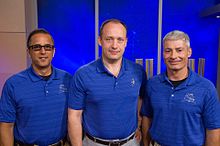Soyuz MS-06
2017 Russian crewed spaceflight to the ISS
 Soyuz MS-06 night launch to the ISS | |
| Mission type | ISS crew transport |
|---|---|
| Operator | Roskosmos |
| COSPAR ID | 2017-054A |
| SATCAT no. | 42937 |
| Mission duration | 168 days 5 hours 13 minutes 58 seconds |
| Spacecraft properties | |
| Spacecraft | Soyuz MS |
| Spacecraft type | Soyuz-MS 11F747 |
| Manufacturer | RKK Energia |
| Launch mass | 7080 kg |
| Crew | |
| Crew size | 3 |
| Members | Alexander Misurkin Mark T. Vande Hei Joseph M. Acaba |
| Start of mission | |
| Launch date | 12 September 2017, 21:17:02 UTC[1] |
| Rocket | Soyuz-FG |
| Launch site | Baikonur, Site 1/5 |
| Contractor | Progress Rocket Space Centre |
| End of mission | |
| Landing date | 28 February 2018 02:31 UTC [2] |
| Landing site | Steppes of Kazakhstan |
| Orbital parameters | |
| Reference system | Geocentric orbit |
| Regime | Low Earth orbit |
| Inclination | 51.66° |
| Docking with ISS | |
| Docking port | Poisk zenith |
| Docking date | 13 September 2017, 02:55 UTC |
| Undocking date | 27 February 2018, 23:08 UTC |
| Time docked | 167 days 20 hours 13 minutes |
 (l-r) Acaba, Misurkin and Vande Hei Soyuz programme (Crewed missions) ← Soyuz MS-05 Soyuz MS-07 → | |
Soyuz MS-06 was a Soyuz spaceflight which launched on 13 September 2017.[1] It transported three members of the Expedition 53 crew to the International Space Station. Soyuz MS-06 was the 135th flight of a Soyuz spacecraft. The crew consisted of a Russian commander, and two American flight engineers.[3] It returned to Earth on 28 February 2018 after 168 days in orbit.[2]
Crew
| Position | Crew member | |
|---|---|---|
| Commander |  Alexander Misurkin, Roscosmos Alexander Misurkin, RoscosmosExpedition 53/54 Second spaceflight | |
| Flight Engineer 1 |  Mark T. Vande Hei, NASA Mark T. Vande Hei, NASAExpedition 53/54 First spaceflight | |
| Flight Engineer 2 |  Joseph M. Acaba, NASA Joseph M. Acaba, NASAExpedition 53/54 Third spaceflight | |
Backup crew
| Position[4] | Crew member | |
|---|---|---|
| Commander |  Anton Shkaplerov, Roscosmos Anton Shkaplerov, Roscosmos | |
| Flight Engineer 1 |  Scott D. Tingle, NASA Scott D. Tingle, NASA | |
| Flight Engineer 2 |  Shannon Walker, NASA Shannon Walker, NASA | |
| External videos | |
|---|---|
 Soyuz MS-06 and ISS over Moscow on 13 September 2017. Soyuz MS-06 and ISS over Moscow on 13 September 2017. |
Due to a decision to cut down the number of participating Russian astronauts in 2017, changes were made in crew assignments to the ISS.[5] Originally set to be on Soyuz MS-04, Alexander Misurkin and Mark T. Vande Hei have been assigned to Soyuz MS-06 instead.[3]
References
- ^ a b Pietrobon, Steven (5 February 2017). "Russian Launch Manifest". Sworld.com. Retrieved 12 February 2017.
- ^ a b Bergin, Chris (27 February 2018). "Soyuz MS-06 returns three ISS crew members to Earth". NASASpaceflight.com. Retrieved 28 February 2018.
- ^ a b "NASA Updates 2017 International Space Station Crew Assignments". NASA. 15 November 2016. Retrieved 22 November 2016.
 This article incorporates text from this source, which is in the public domain.
This article incorporates text from this source, which is in the public domain. - ^ "Manned Spaceflight Launch and Landing Schedule". SpaceFacts. Retrieved 22 November 2016.
- ^ Irene Klotz (16 November 2016). "NASA, Russia Set Flights for Trimmed-Down Space Station Crew". Space.com. Retrieved 21 November 2016.
- v
- t
- e
- Soyuz (rocket family)
- Soyuz (spacecraft)
- Baikonur Cosmodrome
- Soyuz abort modes
- Cosmonaut ranks and positions

(by spacecraft type)
| Soyuz 7K-OK (1966–1970) |
|
|---|---|
| Soyuz 7K-L1 (1967–1970) (Zond lunar programme) | |
| Soyuz 7K-L1E (1969–1970) | |
| Soyuz 7K-LOK (1971–1972) | |
| Soyuz 7K-OKS (1971) | |
| Soyuz 7K-T (1972–1981) | |
| Soyuz 7K-TM (1974–1976) | |
| Soyuz 7K-S (1974–1976) |
|
| Soyuz-T (1978–1986) | |
| Soyuz-TM (1986–2002) | |
| Soyuz-TMA (2002–2012) | |
| Soyuz-TMA-M (2010–2016) | |
| Soyuz MS (2016–present) |
- 2024
Uncrewed missions are designated as Kosmos instead of Soyuz; exceptions are noted "(uncrewed)".
The † sign designates failed missions. Italics designates cancelled missions.
The † sign designates failed missions. Italics designates cancelled missions.













